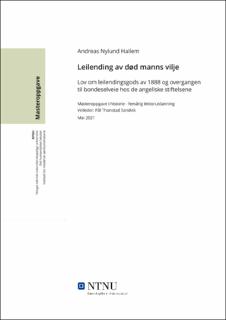| dc.contributor.advisor | Sandvik, Pål Thonstad | |
| dc.contributor.author | Hallem, Andreas Nylund | |
| dc.date.accessioned | 2021-09-13T16:10:58Z | |
| dc.date.available | 2021-09-13T16:10:58Z | |
| dc.date.issued | 2021 | |
| dc.identifier | no.ntnu:inspera:80290154:12020584 | |
| dc.identifier.uri | https://hdl.handle.net/11250/2775805 | |
| dc.description.abstract | Denne oppgavens formål er å studere den politiske behandlingen av leilendingsvesenet på andre halvdel av 1800-tallet, og undersøkelsen er bygget rundt én lov spesielt. Lov om leilendingsgods åpnet i 1888 for at enkelte jordeiere som tidligere hadde vært avskåret fra å selge, fra da av kunne realisere leilendingsgodset de rådde over. Hensikten med loven var å oppløse avhendelsesforbudet av fester på bundet gods, som en kommisjon nedsatt i 1879 hadde funnet at var til hinder for en endelig avvikling av rikets en gang så betydningsfulle jordleievesen.
Oppgaven vil videre drøfte hvilke konsekvenser loven fikk for leilendingene som bygslet jord hos de angellske stiftelsene i årene fra 1888 til ca. 1900. Som det vil bli gjort rede for, var det bestemmelser i loven som direkte og indirekte bidro til å hemme realiseringen av det angellske leilendingsgodset i perioden. Gjennom en passus i lovens § 12 kunne skog som var nødvendig for stiftelsens drift hindre avhendelse, noe som førte til at leilendingene som i 1888 ble gitt muligheten til å kjøpe, ofte ikke hadde en reell mulighet til å bli selveiere. | |
| dc.description.abstract | The aim of this thesis is to study the political treatment of tenant farmers in the second half of the 19th century, and the research is built around one law in particular. Law on tenant farms (norw. Lov om leilendingsgods) of June 23, 1888 gave landlords whom previously had been unable to sell, the possibility from then on to sell the farms to the peasants. The purpose of the law was to dissolve the ban on the so-called “tied land” (norw. bundet gods) that a royal commission in the early 1880´s had found was of hinderance to the final completion of freehold peasant ownership in Norway.
Finally the thesis will examine the consequences of the law for the peasants living on the land of the Thomas Angell Foundation's (Thomas Angells stiftelser) in the years from 1888 to approximately 1900. As will be argued in the discussion, there were several factors that both directly and indirectly obstructed the realization of the tenant farms in this period. Through a passage in the law's section 12, forests that were necessary for the foundation's operations could prevent sale of the farms. In its consequence, this meant that the ban on tied land in reality was not fully discontinued with the sanction of the law on tenant farms. | |
| dc.language | nob | |
| dc.publisher | NTNU | |
| dc.title | Leilending av død manns vilje - Lov om leilendingsgods av 1888 og overgangen til bondeselveie hos de angellske stiftelsene | |
| dc.type | Master thesis | |
